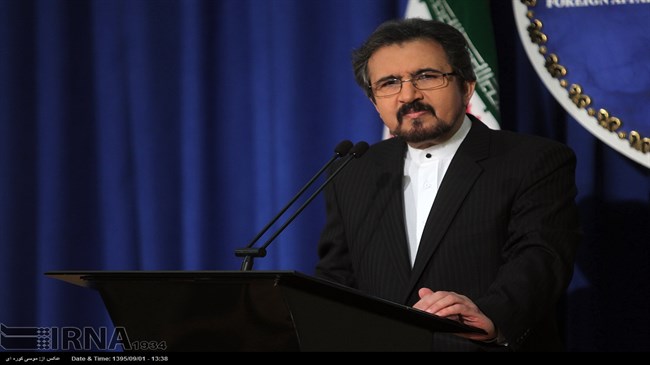
Foreign Ministry: Macron to visit Iran as planned
December 25, 2017 - The Iranian Foreign Ministry dismissed rumors that a state visit by French President Emmanuel Macron to Iran has been “delayed,” clarifying that the trip will take place as planned but that no date has yet been scheduled for it.
“Macron’s trip is on the agenda of the two countries [Iran and France]... and has certainly not been delayed because a date has not been set for it yet,” Foreign Ministry spokesman Bahram Qassemi said during a regular weekly press briefing on Monday.
He dismissed reports that “conditions” have been set in order for the trip to take place, Press TV reported.
"There are no conditions in exchanges of visits and relations by delegations. The two countries enjoy positive relations, there is much interaction between Tehran and Paris, which will continue," Qassemi added.
He said a report that Macron had talked to Saudi King Salman and had made anti-Iran comments "originated" in Saudi Arabia.
"In Paris, and on the website of the French Foreign Ministry, there is no such thing," the Iranian official said.
He explained, however, that Iran had made its stance known before when certain French officials commented negatively on Iran and regional issues.
“They [French officials] are sometimes influenced by the insinuations of Iran’s foes and those who promote Iranophobia,” said Qassemi.
While Iran and France see eye-to-eye on many issues, there are obviously matters on which they disagree, he said.
Responding to a question on reports that the United States was planning to convene a meeting at the United Nations Security Council to discuss Resolution 2231 (2015), Qassemi said those attempts were part of Washington's campaign – under President Donald Trump – to deprive Iran of collecting economic benefits resulting from a nuclear deal.
Resolution 2231 enshrines a nuclear deal struck between Iran and six other countries, including the US, in July 2015.
Qassemi said the US was attempting to put forth the issue of the Iranian missile program and regional policy – issues that are not covered by the deal – to block the deal's benefits accruing to Iran.
“Europe... must be alert and not be duped by the United States,” he said.
Trump has once refused to certify Iranian compliance with the deal under a domestic US law, attempting to justify that decision by claiming that Iran's missile program and regional behavior violated the "spirit" of the deal.
Qassemi said there was only one official institution to verify Iranian compliance with the deal, namely the International Atomic Energy Agency (IAEA).
The IAEA has consistently verified Iranian compliance with its end of the bargain.
Beit-ul-Moqaddas
The Iranian spokesman was also asked about criticism that in the final communiqué of a recent summit of the Organization of Islamic Cooperation (OIC), it was not explicitly stressed that the entire holy city of Beit-ul-Moqaddas belonged to Palestine.
"Our stance on Palestine is clear. In the recent (OIC) summit, we relayed our viewpoints where we had our own considerations, and the best thing that could have been done was done," he said.
He said that the Beit-ul-Moqaddas issue was of great significance to Iran and that the Islamic Republic would not quit a summit on such an important issue merely because one article in the communiqué was not in line with Tehran's position.
On December 13, the 57-member OIC held an emergency summit in Istanbul, Turkey, to coordinate a response to a decision by the US on December 6 to recognize Beit-ul-Moqaddas as the “capital” of Israel.
In its final communiqué, the OIC declared that it would recognize East Beit-ul-Moqaddas as the capital of the State of Palestine and invite all countries to recognize the State of Palestine and East Beit-ul-Moqaddas as its occupied capital.”